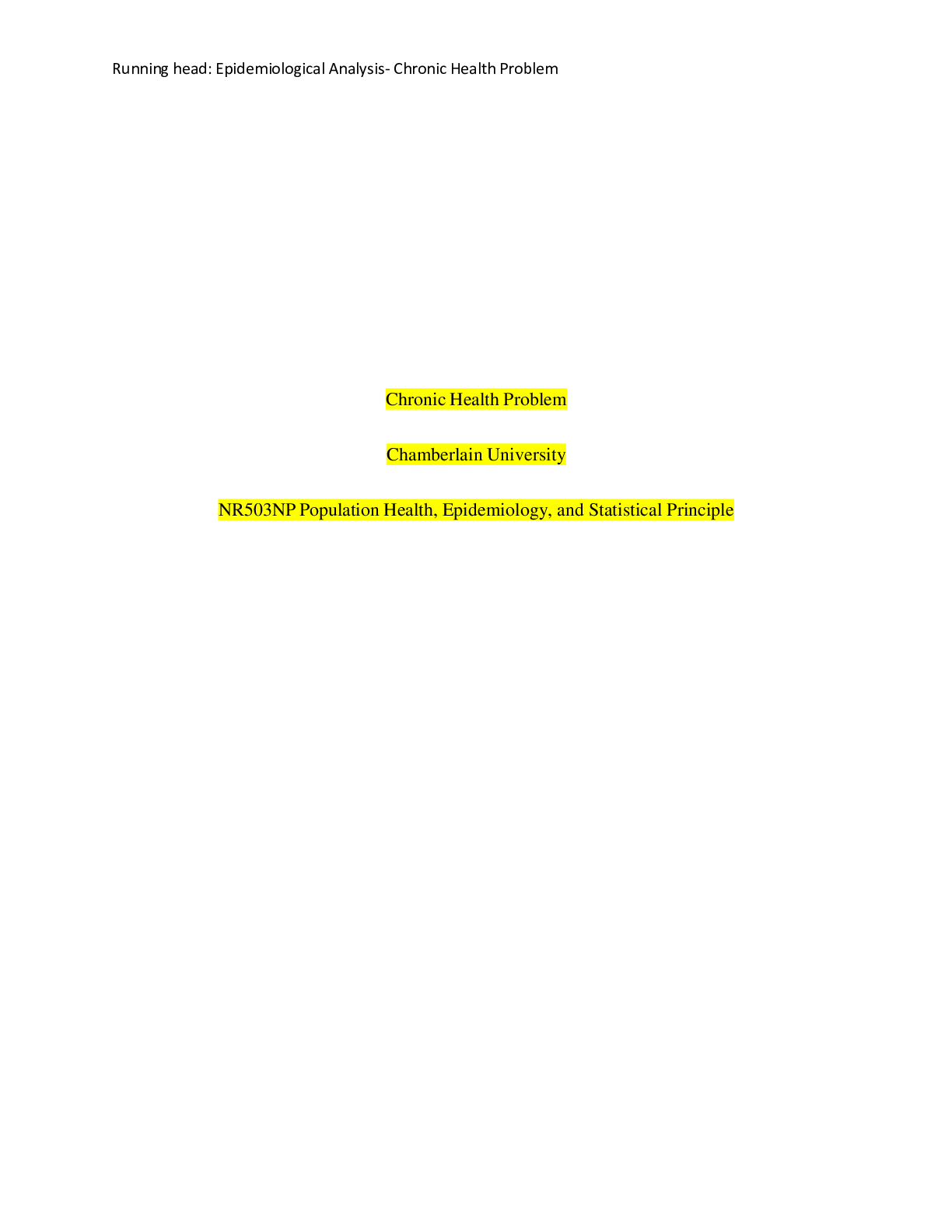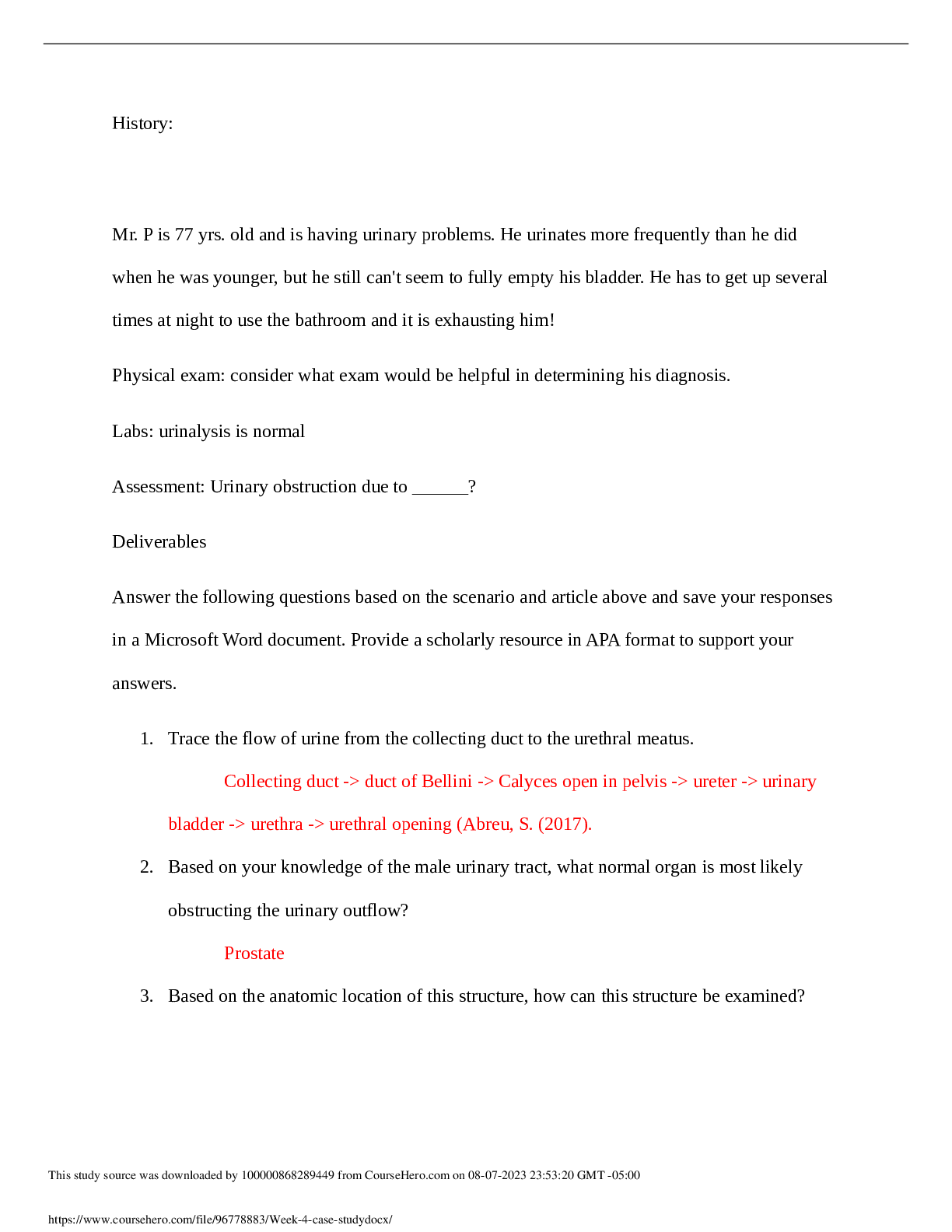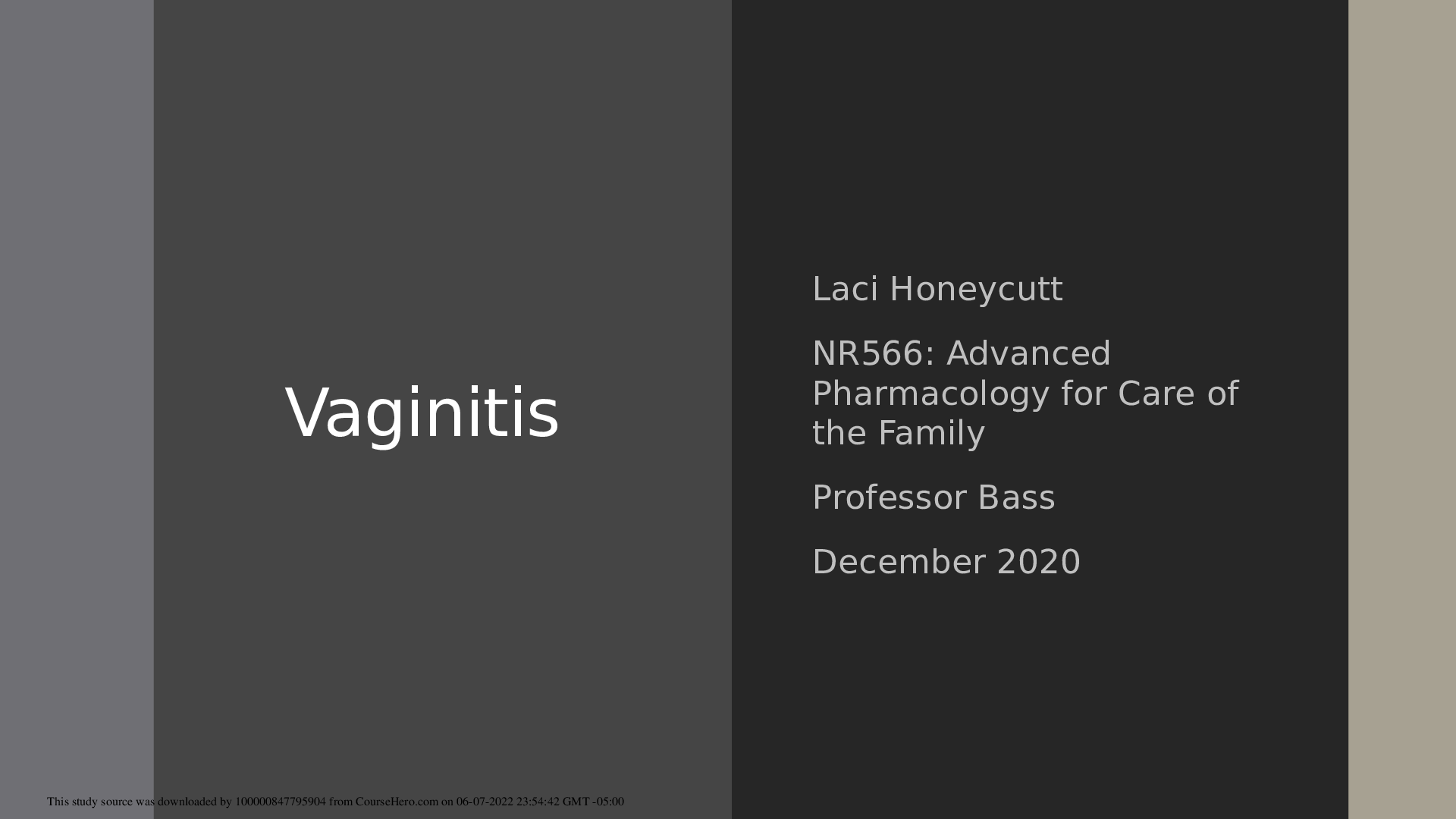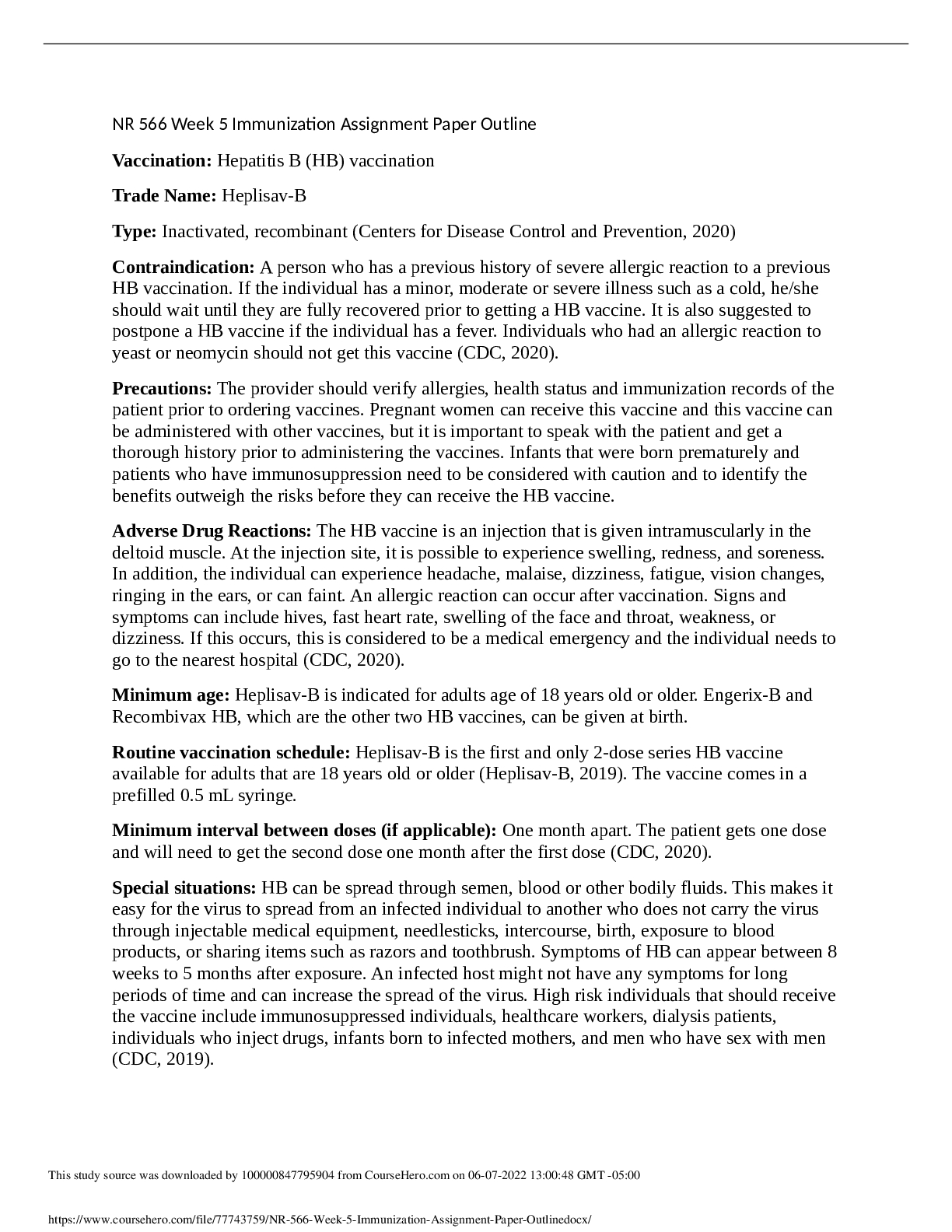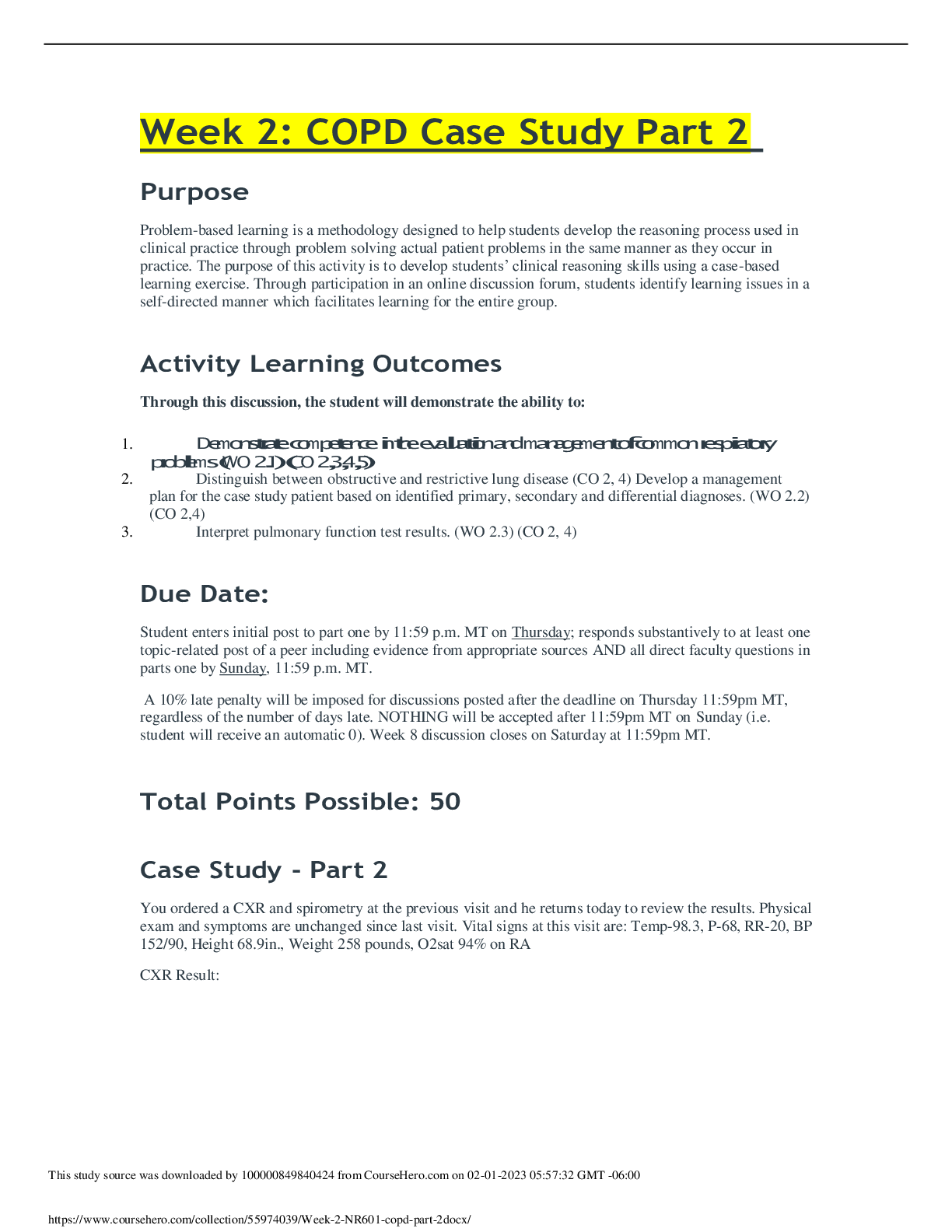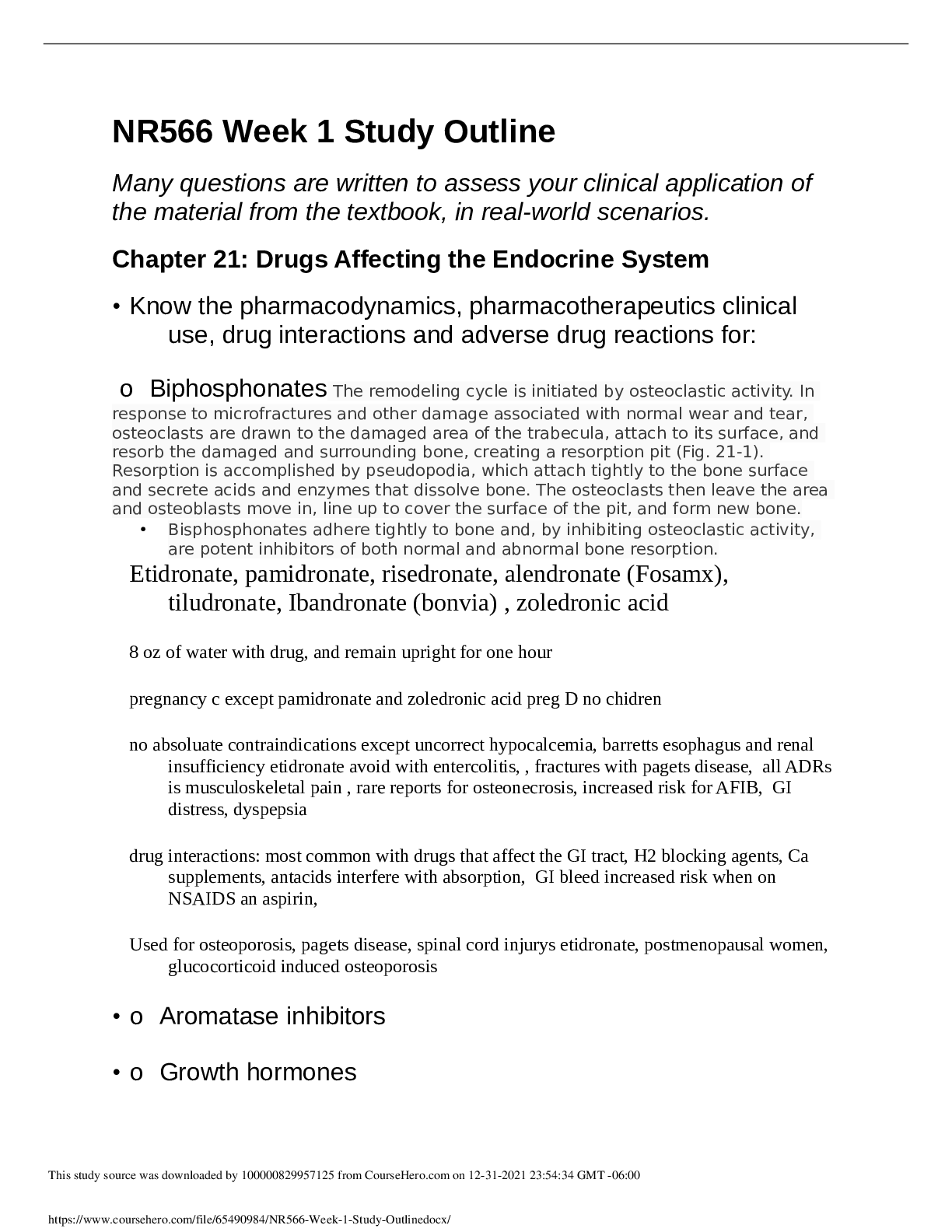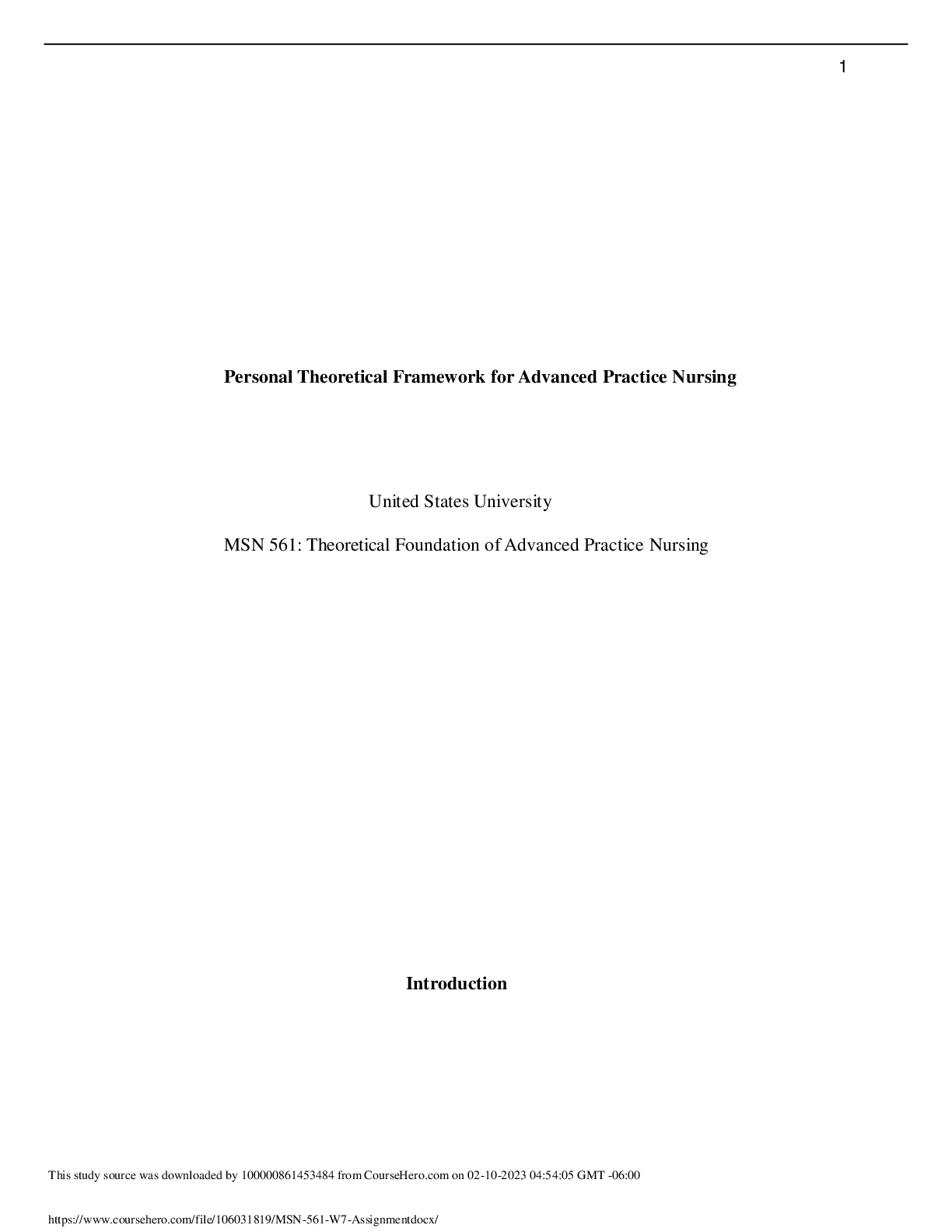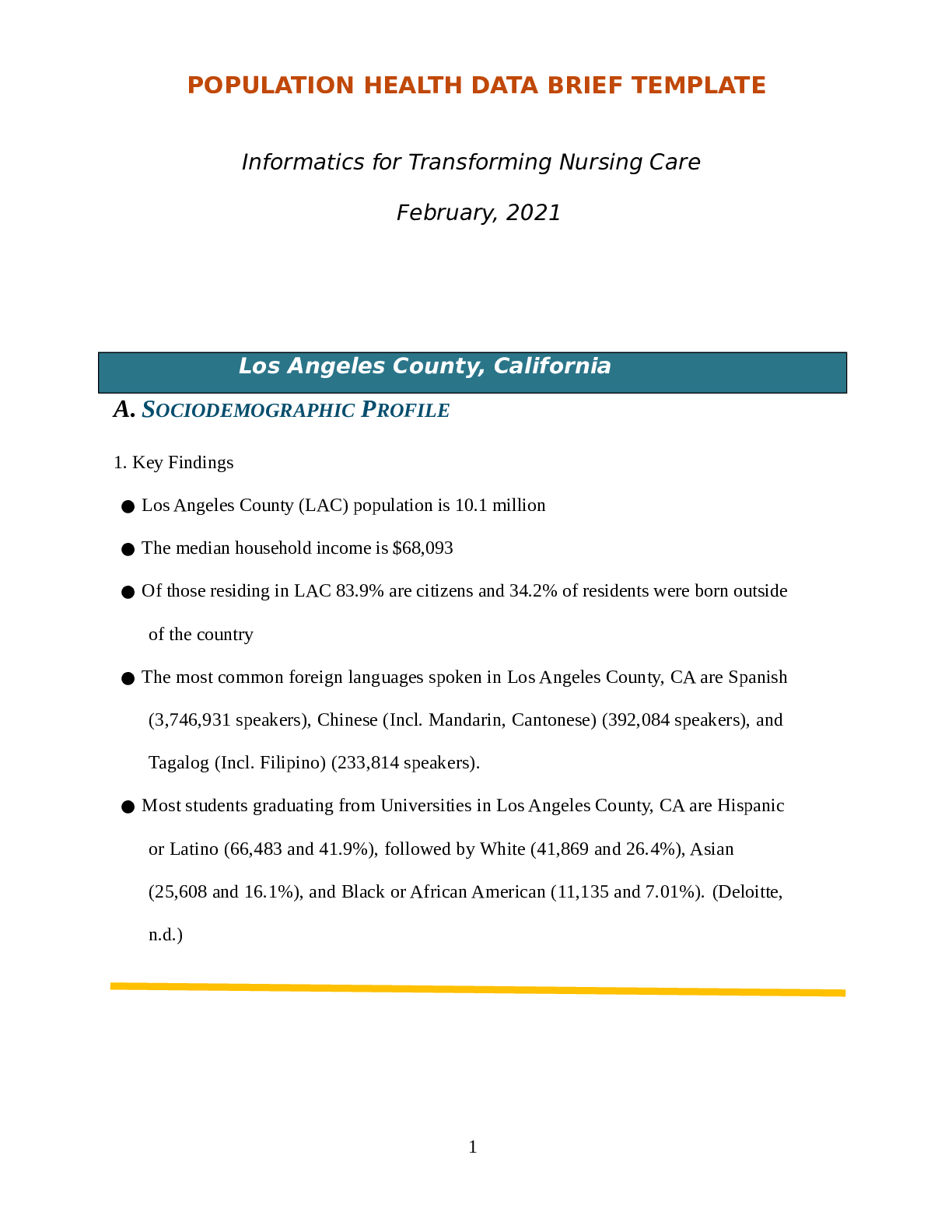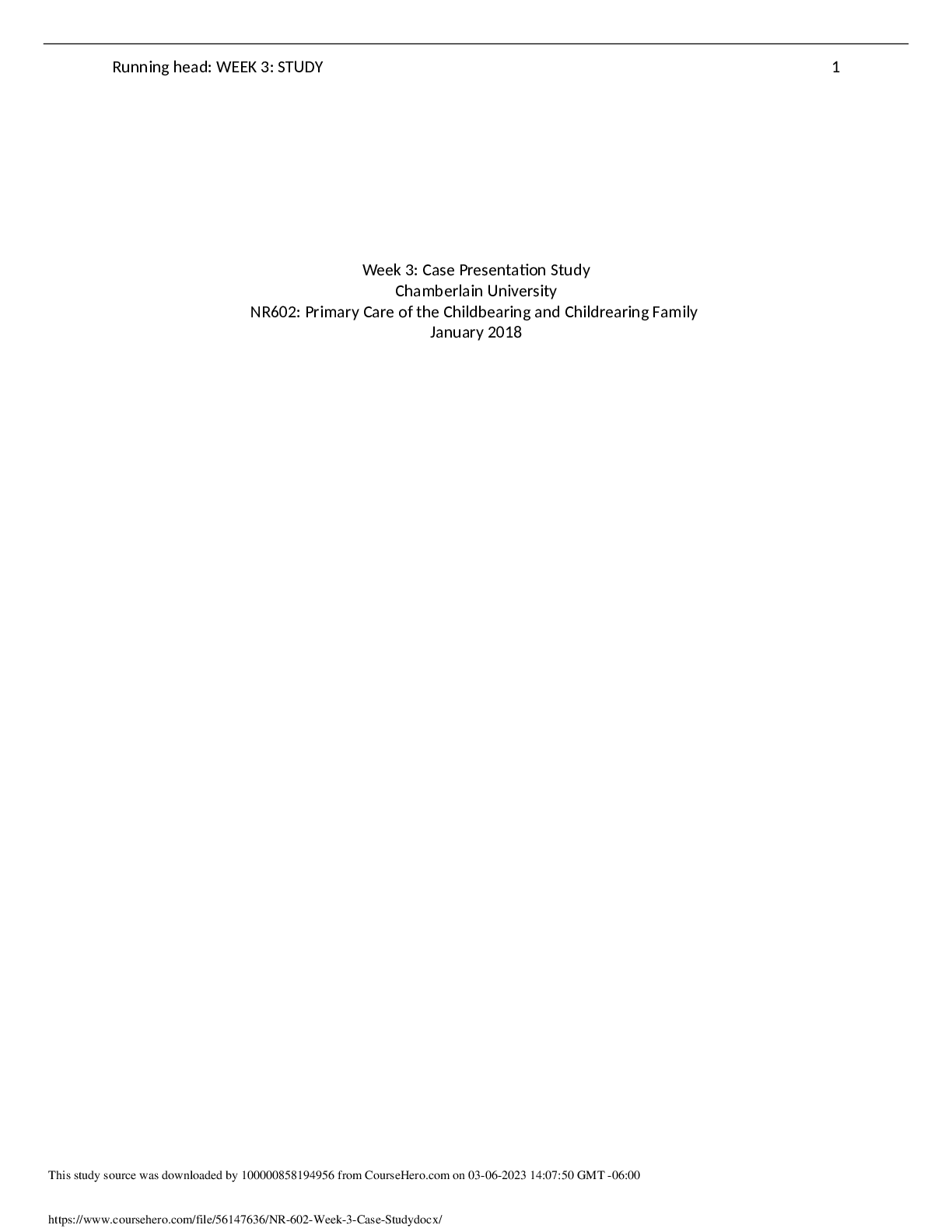*NURSING > CASE STUDY > NR-391 Week 5 Course Project: Milestone 3 – The Interview (Already Graded A) (All)
NR-391 Week 5 Course Project: Milestone 3 – The Interview (Already Graded A)
Document Content and Description Below
Course Project Milestone 3: The Interview Chamberlain College of Nursing NR 391 Transcultural Nursing Good afternoon, my name is Celina Pamplona. I am continuing my education to become a BSN ... prepared nurse. Today is Monday, November 27th, 2017, and it is the day of our scheduled interview. We are currently in one of the exam rooms in our unit because I want to ensure that privacy and confidentiality is maintained during the interview. I will be conducting a transcultural nursing assessment with you. The purpose of this interview is to apply transcultural concepts in nursing. Can you tell me your initials and a little bit about yourself? The interviewee began to introduce herself by stating that her initials are M.V., she is 28-years-old, and currently a registered nurse in New York. Next, I asked M.V. if she was still willing to be interviewed, she verbalized willingness to continue with the scheduled interview. I explained to M.V. that she may refuse to answer questions and can also terminate the interview at any time. M.V. verbalized understanding of informed rights during the interview. Before I begin the interview, I just want to confirm that it is okay to take notes during this interview process. M.V. confirmed that taking notes during the interview process was no problem. To begin, I just want to inform you the organization and process of this interview. This interview contains five main categories. I will ask you one primary question and two follow-up questions for each primary question. Again, you do not have to answer any questions you would not like to and you can stop this interview at any time. Are you ready? M.V. said “yes”. Communication is the first category of the interview. 1. Other than English, can you speak, understand, read, and/or write in another language? M.V.: “Yes, I can fluently speak Tagalog. I can understand when I am spoken to in Tagalog. I can read and write in Tagalog too, I was born in the Philippines so just like America has English in their schools’ curriculum, the Philippines have Tagalog.” 2. Can you give me examples of verbal or non-verbal practices from your culture? M.V.: “Showing respect to the elders is the main verbal and non-verbal practice I can think of from my culture. A verbal example of respect is addressing someone who is older than you with the proper title. The title depends on the gender and age-group, for example, I have an older sister and brother. I have to address my sister as Ate and my brother as Kuya as a sign of respect. Also, when speaking to your parents, adults, and authority figures you need to add “po” to the end of your sentence because that is a verbal sign of respect. Non-verbal communication of respect to elderlies is a gesture called, “mano po”. It is when you greet an adult by bowing your head to the offered hand and you place their hand on your forehead.” I am familiar with “mano po”, do you see the younger Filipino-American generation who were born in America or came to America at a young age practice these signs of respect? M.V. stated that younger generations have modified to a modern greeting by greeting everyone with a cheek to cheek kiss greeting. She said that she has also been practicing much more of this modernize greeting but still practices mano po with elder adults. 3. Can you tell me about a positive or negative experience you had when trying to communicate to someone from a different language and what you did to help make the communication effective? M.V.: “When I first came to America I had a very difficult time speaking to others. English was very hard for me to understand, especially if the person speaks fast. I will never forget this one time I got lost in the city because I took the wrong subway. I knew I should ask for help but I hesitated because I could not speak English well. I approached a woman, I think she was Russian, but she had a very strong accent as well. She understood where I wanted to go but I could not understand her direction. She kept pointing to so many directions but I did not want to be rude and say that I could not understand her. I tried to follow where she pointed to but I was still lost. I ended up asking someone else, a Caucasian man, but he also started pointing and speaking English fast. I ask if he can show me on the map brochure I had. He took out a pen and listed steps on where I need to go to get to my destination. Basically, visual direction on the map helps me understand his instructions. That was such a bad day that I will never forget but I knew if I ever got lost again, I would ask someone to direct me using the subway map.” The second category is health-related beliefs and practices. 1. Describe your beliefs on health in time of wellness and illness and is there any practice you do to stay healthy or when you are not feeling well? M.V.: “I believe in western medicine, especially because I am a nurse. I consider healthy behavior will determine your quality of health. For example, good nutrition, adequate sleep, and exercise will help maintain health wellness. In time of illness, I believe if it does not get better after 3 days, it is time to see a professional. 2. Tell me about a time you went to someone other than a licensed professional or used traditional home remedies to make you feel better. M.V.: “I have never gone to an unlicensed professional if I don’t feel well. However, I do believe that if it is raining outside and your head gets wet, you need to shower right away and drink something warm. I guess it is the hot-and-cold balance that is a traditional practice of my culture to prevent imbalance causing illness. 3. Help me understand the influences that play a major role in your decision-making when it comes to healthcare. M.V.: “The major influence in my decision when it comes to healthcare is my family. If my husband, parents, and older sibling express concern about a symptom I feel that I ignore and wait to pass, I will most likely seek medical help. I do not want them to worry about me so I would make sure I am taken care of so they are not stressed in any way. I would seek all treatment in order to get better for them. ” The third category is nutrition. 1. Describe the foods that you normally eat at mealtime? M.V.: “I usually have rice with breakfast, lunch, and dinner. I eat rice with protein, chicken, beef, or seafood.” 2. Are there specific foods or certain times you do not eat? M.V.: “I do not eat pork, organ-meat, and bitter-melon. Other than that, I am not a real picky eater.” 3. With whom do you usually eat meals with and explain the value of the meal or the mealtime? M.V.: “For breakfast and lunch I can usually eat alone since I am at work. However, dinner time is time with the family. Dinner is served and enjoyed as a family, it is an important practice my parents made sure we did together, and it is something I wish to continue with my future family.” The fourth category is religion and spirituality. 1. Can you identify your practiced religion and describe special spiritual beliefs or practices you take part in? M.V.: “My religion is Roman Catholic. I believe in the Mother Mary and saints. I go to church every Sunday and do the Holy Rosary once a week.” 2. How does your religion and spirituality influence your healthcare behavior and decision? M.V.: “I believe that there is a purpose for everything and I trust that God has a plan for everyone. In times of hardship or illness, faith is tested. I always say that for things we cannot understand, control, or explain, that is when our faith comes in.” 3. Can you explain particular religious belief and/or spirituality practices you would want to have during a time of illness or restrictions we should be aware of? M.V.: “During time of illness, praying is very important. I believe that through prayer healing can happen. In time of illness, I would want the sacrament of the anointing of the sick because it brings physical and spiritual strength during time of sickness and even death.” The fifth and last category is educational background. 1. Can you tell me about your highest level of education you completed? M.V.: “I have a bachelor degree in nursing.” 2. What do you believe is your way of learning? M.V.: “I am a visual or tactile learner. I am not good at retaining written or verbal information when learning. The best learning style for me includes pictures, graphs, videos, and hand-on. 3. Can you explain your culture’s belief and values of education? M.V.: “In the Filipino culture, education is a child’s priority. Education is power that no one can ever take from you.” As we come to the end of the interview, I want to thank you for your willingness and pleasant participation. M.V. stated that she was more than happy to help complete this interview. She continued by saying that she appreciates that I selected her for this interview and felt my interest in knowing detailed information about her Filipino culture. Prior to performing this interview, I researched M.V.’s culture of origin to have some basic knowledge on the Filipino culture. I also compared and contrast what I researched and my interviewee’s answers in the transcultural assessment. In this interview I learned that the Filipino culture values family very much. In all categories, family was always mentioned as an essential role. The information from this interview will create a positive impact in my personal nursing practice. This interview has provided me information that I can apply when caring for an individual with the same origin as M.V. Knowing the Filipino values, beliefs, and practices will guide me to deliver culturally competent care to individuals of the culture. Culture impacts the healthcare that the interviewee receives because she will seek care according to her cultural values and beliefs. However, one’s environment in which they grow and develop can also affect their practices. For example, the interviewee stated that she believed in western medicine. Her belief of so was influenced by her nursing education and experience. M.V.’s Filipino culture influences how she communicates verbally and non-verbally, her actions, beliefs, present/future practices, values, and morals. It is important to consider an individual’s overall belief, practices, and values in order to provide culturally competent care. Completing this interview will guide my practice to deliver cultural competent nursing care for individuals with the similar culture of origin. REFERENCES Dela Cruz, M.T. & Periyakoil, V.J. (2010). Health and health care of Filipino American older adults. Retrieved from http://geriatrics.stanford.edu/wp content/uploads/downloads/ethnomed/filipino/downloads/filipino_american.pdf [Show More]
Last updated: 1 year ago
Preview 1 out of 8 pages
Instant download
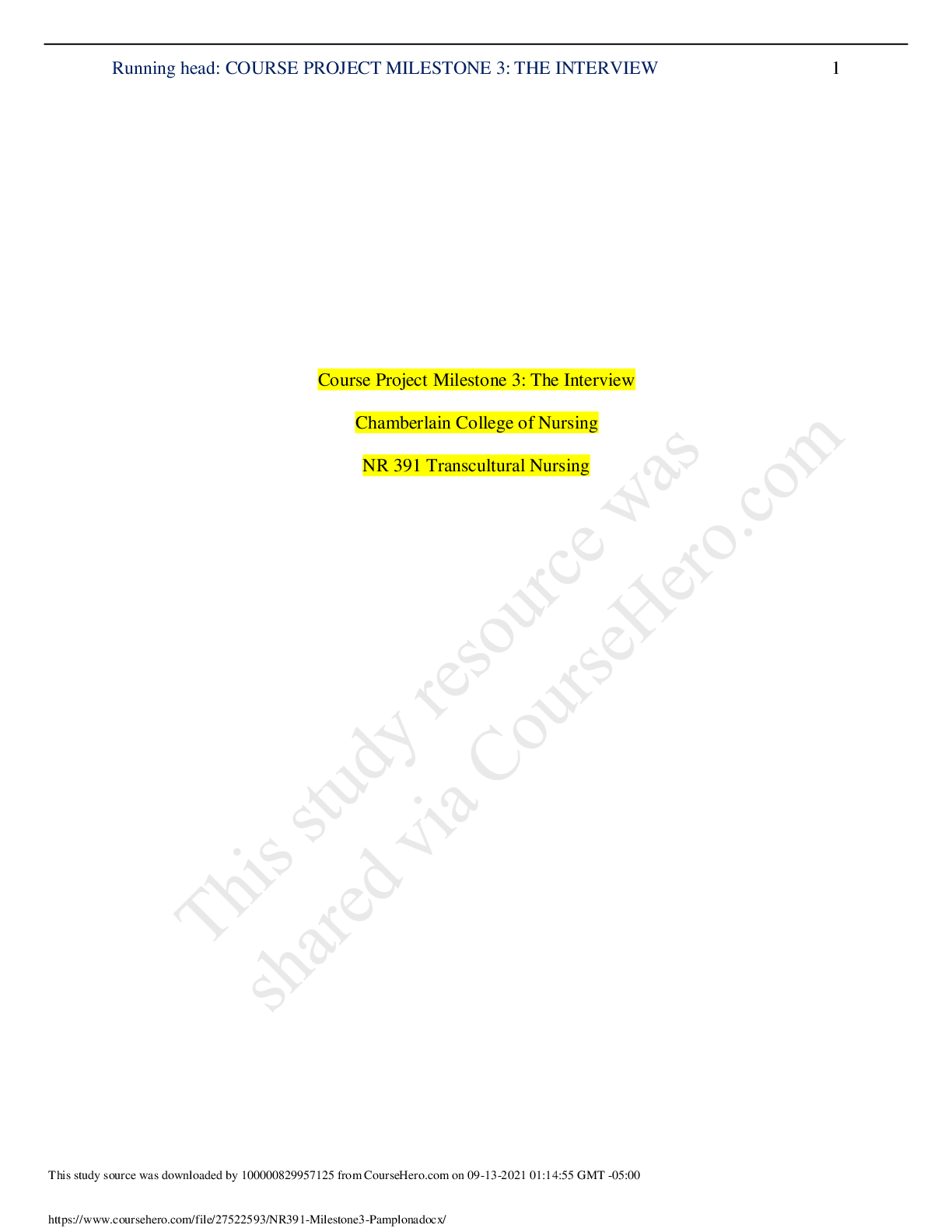
Buy this document to get the full access instantly
Instant Download Access after purchase
Add to cartInstant download
Also available in bundle (1)
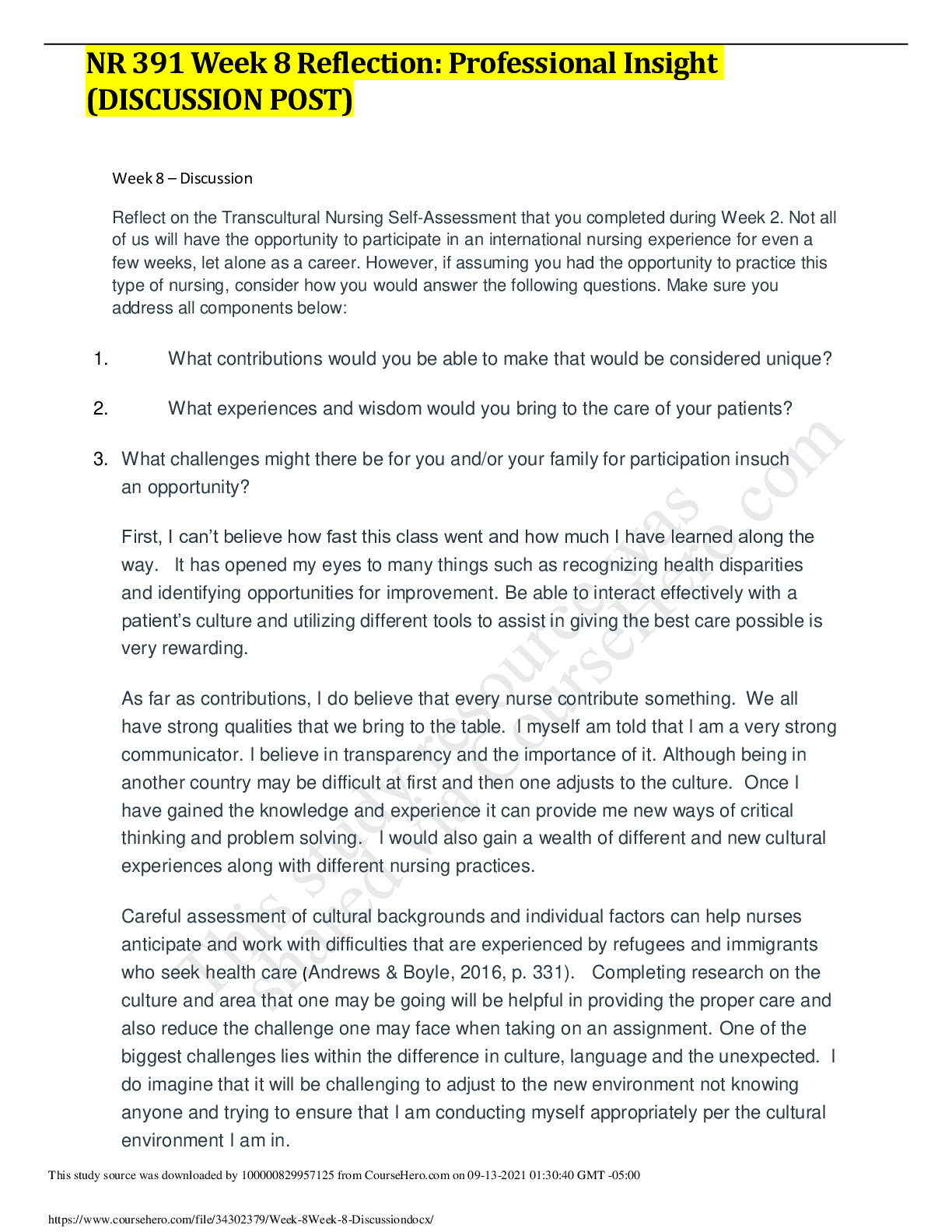
NR 391 Transcultural Nursing (NR 391 Complete Coursework Week 1 – 8) BUNDLE | 100% VERIFIED PAPERS.
NR 391 Transcultural Nursing (NR 391 Complete Coursework Week 1 – 8) BUNDLE | 100% VERIFIED PAPERS.
By Goodluck Academia 2 years ago
$14
11
Reviews( 0 )
Document information
Connected school, study & course
About the document
Uploaded On
Sep 13, 2021
Number of pages
8
Written in
Additional information
This document has been written for:
Uploaded
Sep 13, 2021
Downloads
0
Views
60

